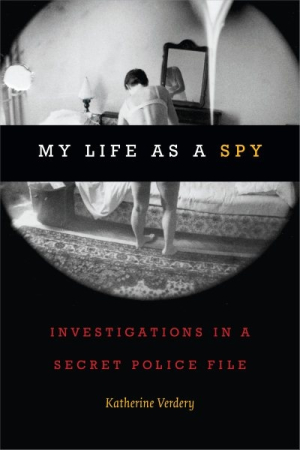My Life as a Spy
Investigations in a Secret Police File
“There is nothing like reading your own police file to make you wonder who you really are,” Katherine Verdery reflects in her true-life, anthropological whodunit. My Life as a Spy describes Verdery’s ethnographic fieldwork in communist-controlled Romania during 1973 and 1974, resulting in a memoir with the exciting elements of an espionage thriller.
Now the Distinguished Professor of Anthropology at the Graduate Center of the City University of New York, Verdery recounts her life among Romanian villagers during her doctoral research under the brutal communist dictatorship of Nicolae Ceausescu, whose Securitate (the secret service) kept close tabs on her. The Securitate operated through an extensive number of informers, mostly villagers with whom Verdery lived.
In 2008, Verdery received her Securitate file. It included 2,781 pages of detailed, if not always accurate, reports revealing her daily activities and personal relationships with—unknown to her at the time—secret Securitate informers who were her hosts and friends. The best parts of the book are the author’s discussions with the informers and three high-level operatives about why they pretended to befriend the author when their primary objective was to feed information to the Securitate. In poignant detail, Verdery reveals that many of these seventy informers found Verdery charming, and in later years befriended her. They had simply been coerced into joining the Securitate because they and their families were threatened.
The book generally flows briskly with its many charming, humorous, and intriguing stories, but at times it lapses into dry academic discourse. The memoir charts the author’s return visits to Romania over the next three decades, and concludes with her own investigation of why, after having been branded a danger, she was allowed to return for further study.
This work of anthropological intrigue shows the author’s academic coming-of-age. She grows from a novice researcher with preconceived notions of Romanians and their culture into an accomplished scholar who appreciates the complexities of Romanian life under communist rule, with its limited options and few freedoms.
Reviewed by
Karl Helicher
Disclosure: This article is not an endorsement, but a review. The publisher of this book provided free copies of the book to have their book reviewed by a professional reviewer. No fee was paid by the publisher for this review. Foreword Reviews only recommends books that we love. Foreword Magazine, Inc. is disclosing this in accordance with the Federal Trade Commission’s 16 CFR, Part 255.

